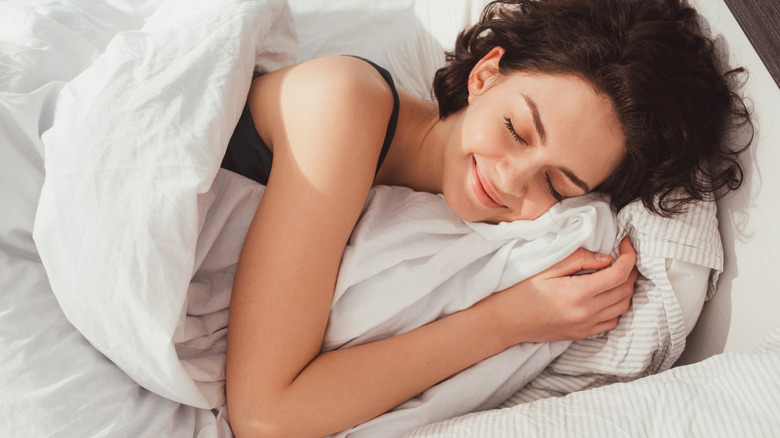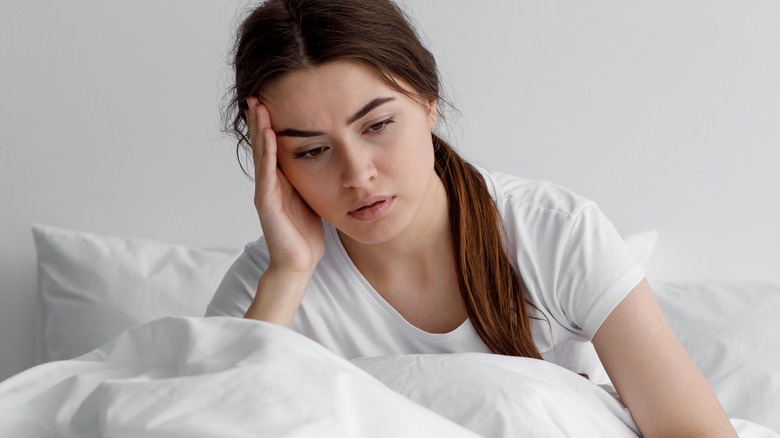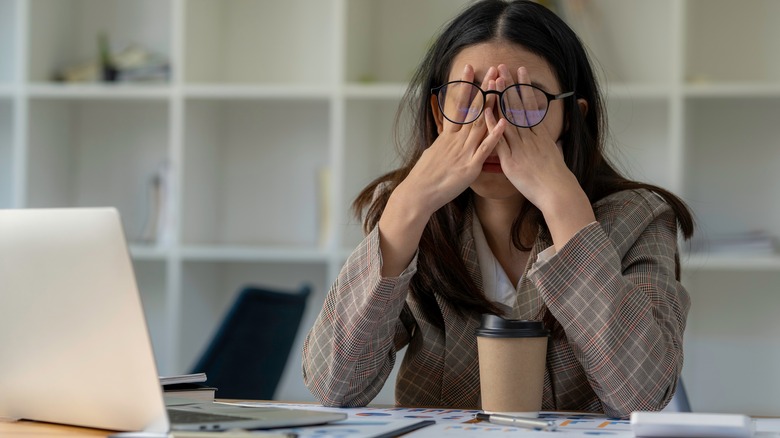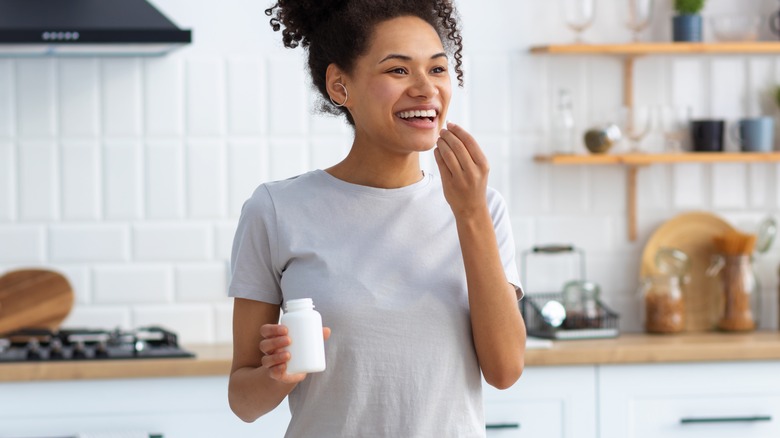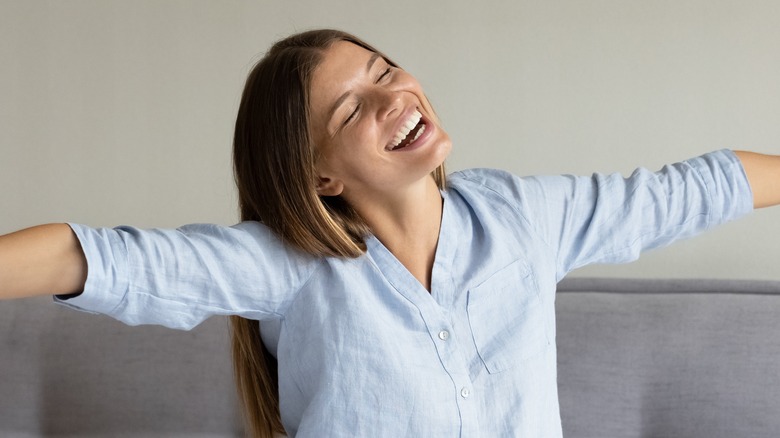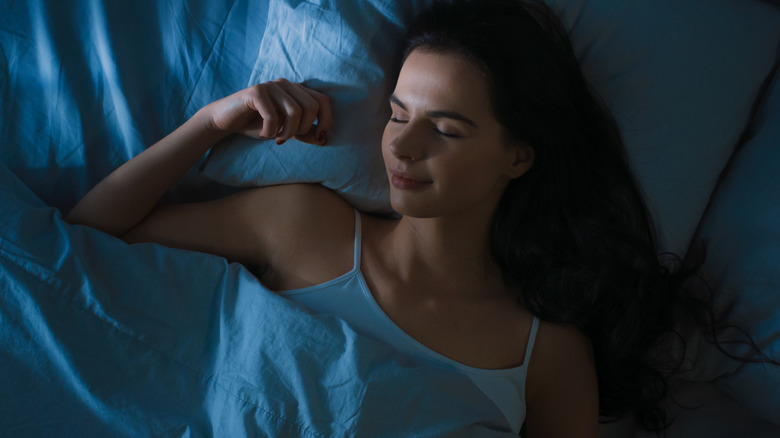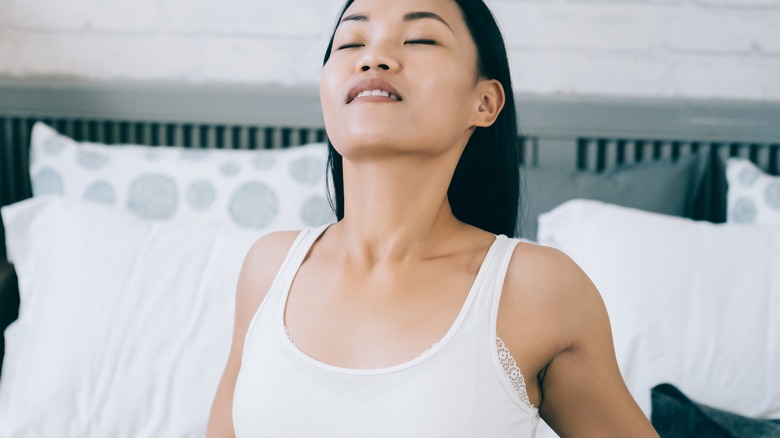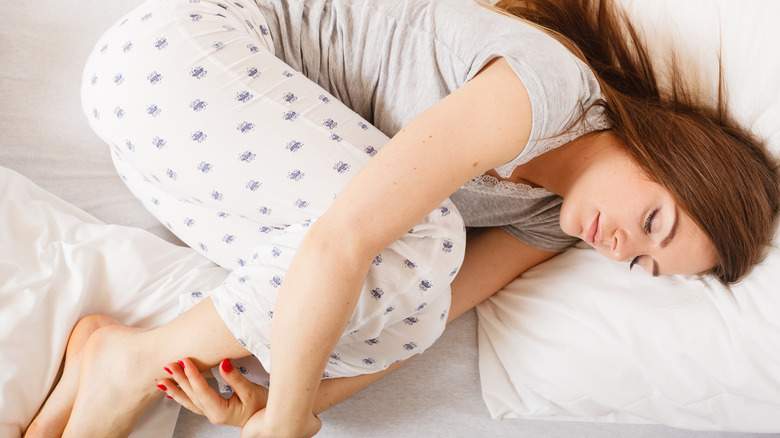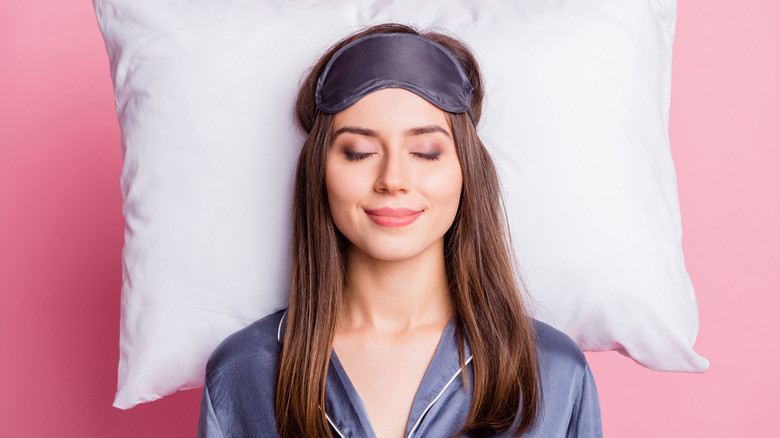Tips For Getting A Better Night's Sleep When You're On Your Period
Women are much more likely to experience sleep problems than men. In fact, according to the National Sleep Foundation, women have a risk of insomnia throughout their lives that is "as much as 40% higher" than men.
Although there are many contributing factors, changes in hormones during the different stages of a woman's life are a major factor. Your monthly menses are a main culprit, and they can last an average of 40 years, according to the Office on Women's Health. That's a long time to lose sleep.
The good news is there are many ways you can reduce your risk of sleep problems and increase sleep quality during your period. These include following a healthy diet and getting regular exercise, reducing stress, taking supplements, and setting yourself up for a good night's sleep, even if you experience cramps or a heavy flow. Making these changes can go a long way toward improving your overall well-being and helping reduce the impact of your menstrual cycle on your quality of life.
How your period affects sleep
The menstrual cycle has three phases — follicular, ovulatory, and luteal — that are managed by a complex interaction between hormones, including luteinizing hormone, follicle-stimulating hormone, estrogen, and progesterone (via MSD Manual).
The luteal phase is the second half of your cycle, in the later stages of which premenstrual syndrome begins. The first day of your period marks the follicular phase, or the beginning of your cycle. These are the times when you're most likely to experience sleep disturbances due to imbalances in the levels of estrogen and progesterone in your body. At the end of your cycle, if an egg is not fertilized, levels of estrogen and progesterone fall and your period begins, then levels begin to rise again (via UCSF Health).
According to a 2020 review in Neuroscience & Biobehavioral Reviews, research has found a correlation between low levels of estrogen and progesterone and poor sleep. Many other factors can contribute to poor sleep before and during your period. Night sweats (caused by hormonal fluctuations) and cramps can wake you up in the middle of the night (via the Cleveland Clinic). Hormones can affect your mood and increase your stress level, which can also prevent you from getting a good night's sleep (via the Mayo Clinic).
Eat a healthy diet
The fatigue you feel before and during your period may make you want to pop a slice of pizza in the oven and call it dinner. Unfortunately, that's not going to do you any favors.
According to the Royal Women's Hospital, a healthy diet is key to reducing period-related symptoms, including poor sleep. Research suggests that getting more omega-3 fatty acids, calcium, and vitamin D can help improve symptoms. A healthy diet highlighting these nutrients includes plenty of fresh fruits and vegetables; fish, flax, and chia seeds for omega-3s; low-fat dairy for calcium and vitamin D; proteins such as eggs and beans; and whole grains, including oats, brown rice, and buckwheat.
Lean meat can help you meet increased iron needs, especially if you have a heavy period, but avoid saturated fats from butter, cream, bacon, and snack foods. You should also avoid caffeine and alcohol, as both can worsen physical symptoms of PMS and ruin your sleep. According to the Sleep Foundation, moderate alcohol intake decreases sleep quality by 24%, and a 2018 study in BMJ Open found that alcohol intake moderately increases the risk of PMS. Although it's unclear whether caffeine affects PMS, it is clear that it affects sleep (via The American Journal of Clinical Nutrition and the Sleep Foundation). Caffeine blocks adenosine, a sleep-promoting chemical, and can interfere with circadian rhythms, or the body's sleep-wake cycle. If you can't live without coffee during your time of the month, avoid it at least six hours before bedtime.
Don't skip exercise
When you're on your period, the fatigue you feel can be extreme and prohibitive of exercise. You likely want to sleep in as long as you can and face plant on the sofa when you get home from work. But according to The American College of Obstetricians and Gynecologists, exercise can actually reduce PMS symptoms such as depression and fatigue. It can also relieve menstrual cramps, per a 2018 study in the Journal of Education and Health Promotion. Study participants who performed aerobic exercise for 30 minutes thrice a week for eight weeks had significant improvement in pain compared to a control group that didn't exercise. For the most benefits, it's important to stay active not only before and during your period, but all month long.
Regular exercise is also key for good sleep. According to Johns Hopkins Medicine, there is solid scientific evidence that exercise helps you fall asleep and improves sleep quality. Specifically, it increases the amount of deep sleep you get. Deep sleep is when your body rejuvenates and recovers. However, it's best not to exercise for at least one to two hours before bed, as physical activity releases endorphins and raises your core body temperature, both of which can make it harder for you to nod off when your head hits the pillow.
Don't feel like you have to kill your workouts during this time, though. A brisk walk or jog, yoga, or a low-intensity weight training session is enough (via Healthline).
Reduce period stress
Life in general is stressful, but your period can make everything worse. According to a 2017 study in Neuropsychiatric Disease and Treatment, hormone fluctuations increase emotional discomfort during the week before your period. This can increase your sensitivity to stress and affect your work and your personal life. Stress is a killer for good sleep. High levels of stress cause it to take longer to fall asleep and can fragment your sleep, meaning you wake up throughout the night (via Baylor College of Medicine). To make matters worse, lack of sleep increases levels of the stress hormone cortisol, which can make it even harder for you to sleep soundly.
Having a stress-reduction plan in place throughout your cycle is important for your overall health and can nip those sleep-destroying stressors in the bud. Eating a healthy diet, exercising regularly, meditation, avoiding excess caffeine and alcohol, doing yoga and connecting with friends and family are all good ways to reduce stress (via Mayo Clinic). Especially right before and during your period, it's important to practice self-care. Don't load too much onto your plate during this time when you're more prone to stress sensitivity. Take more time for yourself to relax, enjoy a cup of hot tea, take a warm bath, etc., in the evenings so you can wind down and set yourself up for sound sleep (via Ovia Health).
Try supplements
Research shows that certain supplements may be able to relieve period-related symptoms that can get between you and a good night's sleep. Low levels of calcium, especially during the luteal phase of the menstrual cycle, have been shown to exacerbate PMS symptoms, causing depression, hallucination, and restlessness, according to a 2019 review in Obstetrics & Gynecology Science. Additionally, women with adequate levels of vitamin D had a lower risk of PMS symptoms than other women. Vitamin D and calcium work synergistically to aid absorption; having low levels of one can increase the risk of deficiency of the other (via NIH). For women, the recommended daily allowance (RDA) of calcium is 1,200 milligrams and 600 IU (international units) for vitamin D.
Magnesium may also help in easing symptoms including depression, anxiety, and bloating, per a 2010 study in the Iranian Journal of Nursing and Midwifery Research. In a 2012 study in the Journal of Research in Medical Science, magnesium supplementation improved insomnia in a group of elderly people, and it can also be helpful in the treatment of many health conditions, including PMS, via a 2017 review in Scientifica. Magnesium deficiency is common, so it's worth getting your levels checked (via Cleveland Clinic). The RDA for women for magnesium is 310 to 320 milligrams (via NIH).
Other supplements that may benefit sleep include vitamins E, C, B12, B6, valerian, glycine, GABA, chamomile, and passionflower (via The Sleep Doctor and the Sleep Foundation). Always consult with your doctor before taking a new supplement.
Take melatonin
Another popular sleep supplement, melatonin, may be of particular importance during your period (via Sleep Health Foundation). Melatonin is a hormone produced by your body that helps you get restful sleep. Your body produces it in response to low light levels, telling you when it's time to go to sleep.
Some research shows that melatonin levels are lower in women during their period, which likely contributes to common sleep problems (via the American Academy of Sleep Medicine). According to a 2013 meta-analysis in PLOS ONE, melatonin reduces time to fall asleep, increases total sleep duration, and improves sleep quality. It's sold over the counter, and has fewer side effects compared to prescription sleep medications. It's typically taken one hour before bedtime. Doses of 0.5 to 5 milligrams are common, and are similarly effective (via Sleep Health Foundation).
It's best to start with the lowest dose possible, and increase if you find that you need more. You should also discuss using melatonin with your doctor, as it may interact with some medications (via the Mayo Clinic).
Practice good sleep hygiene
Sleep hygiene is a collection of habits that make it easier to fall asleep and sleep more soundly. In order for sleep hygiene to be effective, you must practice it all the time, not just during your period. According to the Centers for Disease Control and Prevention (CDC), good sleep hygiene includes going to bed and waking up at the same time every day. This trains your body's internal clock to know when it's time to go to sleep and when it's time to wake up. Make sure your bedroom environment is conducive to sleep. It should be quiet, dark, and cool, with comfortable bedding. Avoid electronic devices such as phones, computers, and TVs before bed, because the blue light can be stimulating and keep you up (via the Sleep Foundation).
If night sweats keep you up, the Cleveland Clinic suggests wearing loose-fitting lightweight cotton or linen pajamas, using pillows and mattress covers with cooling gel, keeping an ice pack under your pillow and flipping it to the cool side when you feel warm, sipping cool water through the night, and avoiding things that can cause you to sweat (including spicy foods, alcohol, and exercise) right before bed.
Having a pre-bedtime routine can also set you up for a restful night's sleep. In addition to having a set bedtime and ditching the electronics, a bedtime routine might also include taking a warm bath, drinking chamomile tea, doing some gentle stretches, and listing to calming music (via Sleep Foundation).
Try breathing techniques
Breathing exercises help calm the parasympathetic nervous system to get you into a relaxed state for sleep (via Frontiers in Psychiatry). You can do breathing exercises as part of your pre-bedtime routine, if you wake up during the night and can't get back to sleep, or anytime throughout the day to control your stress level.
Breathing exercises include inhaling and exhaling in a slow and controlled manner, focusing on the sensations and sounds of the breath. This is a form of mindfulness meditation that helps you stay aware of the present moment (via Mindful). It's a bit like counting sheep in that it forces you to focus on a specific task instead of letting your mind wander to thoughts that may be keeping you up.
There are many different techniques you can try, but 4-7-8 breathing is an easy place for newbies to start (via Dr. Weil). Here's how to do it: Sit up or lie down in bed. Close your eyes. Rest the tip of your tongue against the back of your front teeth. Exhale fully, allowing your lips to part. Close your lips and inhale through your nose for a slow count of four. At the top, keep your breath in for a slow count of seven. Then, exhale fully through your mouth for a slow count of eight. Repeat this cycle a few more times.
Reduce pain from cramps while sleeping
The pain of menstrual camps can make it difficult to fall asleep and stay asleep. Any type of pain makes it harder to get shut-eye because it causes the body to tense up, and the body needs to relax in order for you to fall asleep (via Forbes).
Over-the-counter nonsteroidal anti-inflammatory drugs (NSAIDs) such as ibuprofen are often recommended for menstrual cramps (via Cochrane). You can also find relief from placing a heating pad on your abdomen, which, as a 2018 research review in Scientific Reports found, was as effective as NSAIDs for treating pain from menstrual cramps. You can also try sleeping in the fetal position, on your side with your knees tucked up toward your chest. This takes pressure off your abdominal muscles and can relieve pressure that can contribute to cramping and pain (via SleepScore Labs).
Aromatherapy and massage can help, too. A 2018 research review in the Journal of Clinical Medicine found that inhalational aromatherapy and aromatherapy massage was better than a placebo at reducing menstrual pain. Some essential oils that may provide relief include lavender, rose, fennel, and peppermint.
Manage your flow
Heavy menstrual bleeding affects over 10 million women in the U.S. each year, and it is among the most common problems women report to their doctors (via the CDC).
Signs of a heavy period include soaking through one or more pads or tampons each hour for several consecutive hours, needing to double up on pads to contain your flow, and having to change your pads or tampons at least once during the night. That last one's enough to interrupt your sleep, but there's also the additional anxiety many women feel about leakage that can keep them up at night (via Forbes).
Some things you can do to ease your nighttime anxiety and trips to the bathroom include using a super strength tampon in addition to an overnight sanitary pad. Some women find that a menstrual cup is better able to hold their flow overnight, and you can combine that with an overnight pad for extra protection (via Steps for Living). You can protect your bedding by placing an old blanket underneath you while you sleep and using a waterproof mattress cover that is easy to throw in the washing machine in case of an accident.
When to see your doctor
Sleep is when your body repairs itself and recovers from the stressors of daily life (via NIH). Thus, lack of sleep can have deleterious effects on your physical and mental health, including contributing to a host of diseases such as type 2 diabetes, obesity, heart disease, and depression (via the CDC). It can also worsen the effects of pre-menstrual symptoms (via Sleep & Breathing). Getting adequate amounts of quality sleep is important throughout your cycle, but it's paramount just before and during your period. If you've tried the recommendations here and you're still struggling to get your Zzzzs, it's time to talk to your doctor.
For heavy menstrual flow and cramping, you've got lots of options, from birth control to surgical interventions (via Texas Health Resources). If PMS is skyrocketing your stress levels, affecting not only your sleep but your job and relationships, there are things that can help, including medications like selective serotonin reuptake inhibitors (SSRIs) and therapy. Your doctor can also make sure that your sleep problems aren't related to any other underlying health conditions or nutrient deficiencies.

